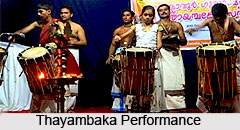 Thayambaka is a solo chenda (a cylindrical percussion instrument) performance that belongs to the Kerala state of India. It is a temple art and flourished during the feudal era. In the performance of Thayambaka the main player who stands at the centre, improvises rhythmically on the beats of half-a-dozen chenda and ilathalam players around.
Thayambaka is a solo chenda (a cylindrical percussion instrument) performance that belongs to the Kerala state of India. It is a temple art and flourished during the feudal era. In the performance of Thayambaka the main player who stands at the centre, improvises rhythmically on the beats of half-a-dozen chenda and ilathalam players around.Performance of Thayambaka
While performing Thayambaka, the focus lies on the stick-and-palm rolls that are produced on the itantala (treble) of the chenda, while the rhythm is laid by the fellow instrumentalists on the valanthala (bass) chendas and ilatalam (cymbals). The performance lasts for around 90 minutes. Initially, it begins at a slow pace and thereafter it is played on a medium tempo and finally culminating in a high speed. It progresses on a skeletal pattern. The main performer has the liberty to improvise and innovate so that he can showcase his grip of rhythm, skill of techniques and logical brilliance. This art allows maximum freedom to the main performer.
Though Thayambaka is a temple art, it is also performed outside shrines. It is performed mostly at the annual festivals soon after the sunset ritual of deeparadhana inside the sanctum. There have been thayambaka performances with more than one main player. If there are two performers, it is called double thayambaka; and if there are three, it is known as triple Thayambaka and if there are five it is known as the pancha thayambaka.
Major Schools of Thayambaka
The two major schools of Thayambaka are at Malamakkavu and Palakkad. The Malamakkavu School is known for its precise progression and grammatical purity. The Palakkad School is known for its emphasis on an improvisation-filled Kooru and a prolonged patterned irikida.
For more, visit the link below: